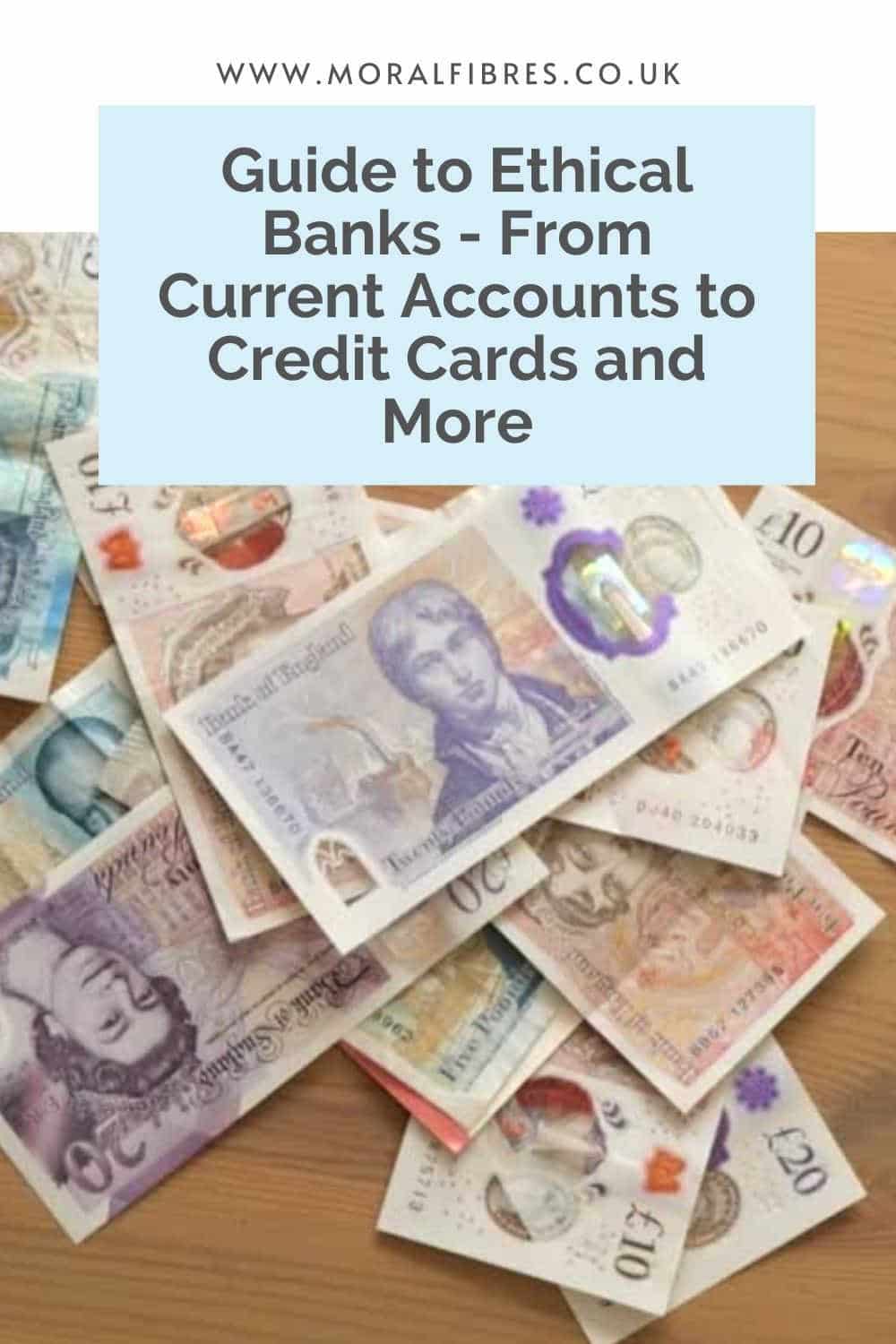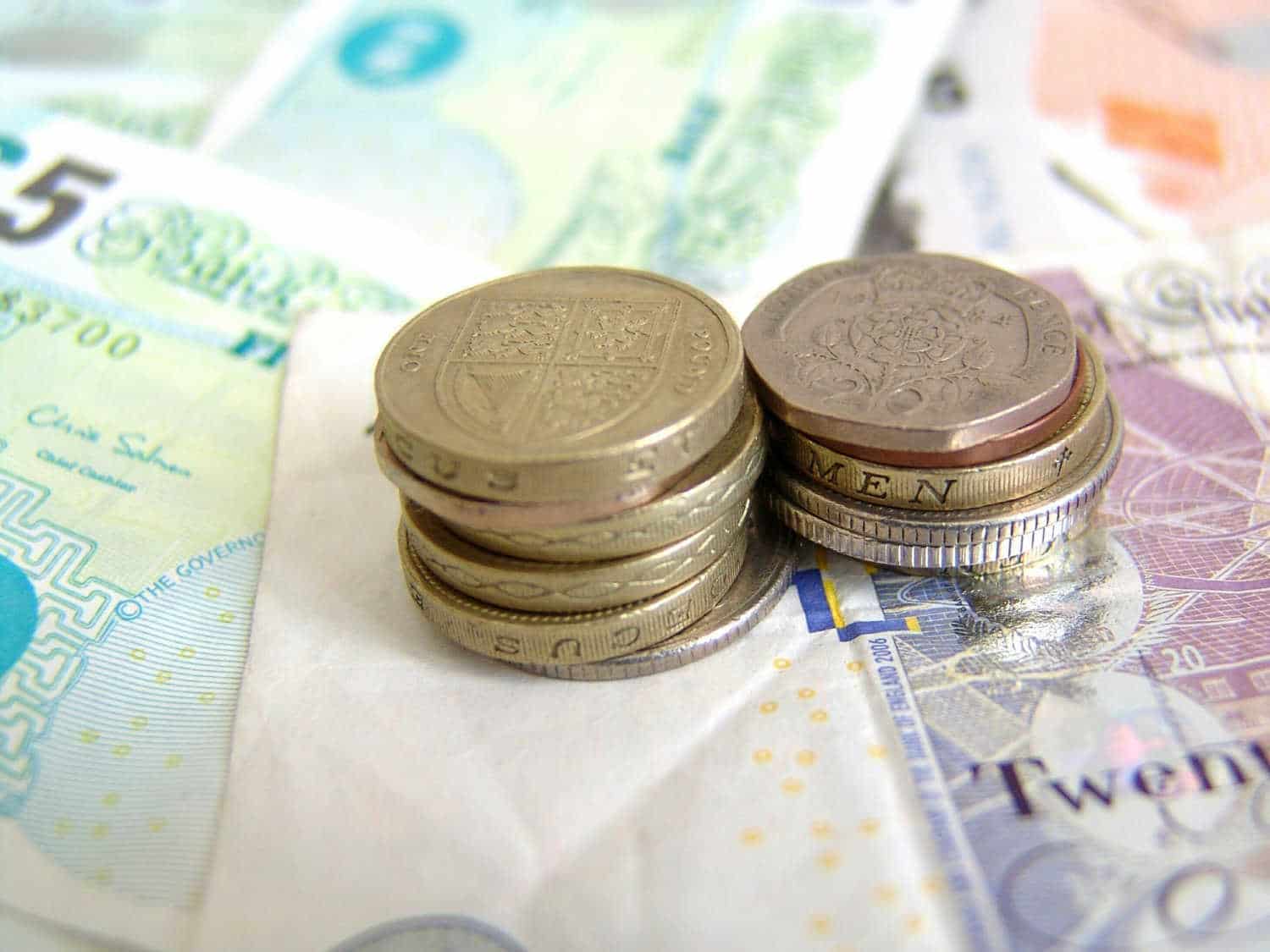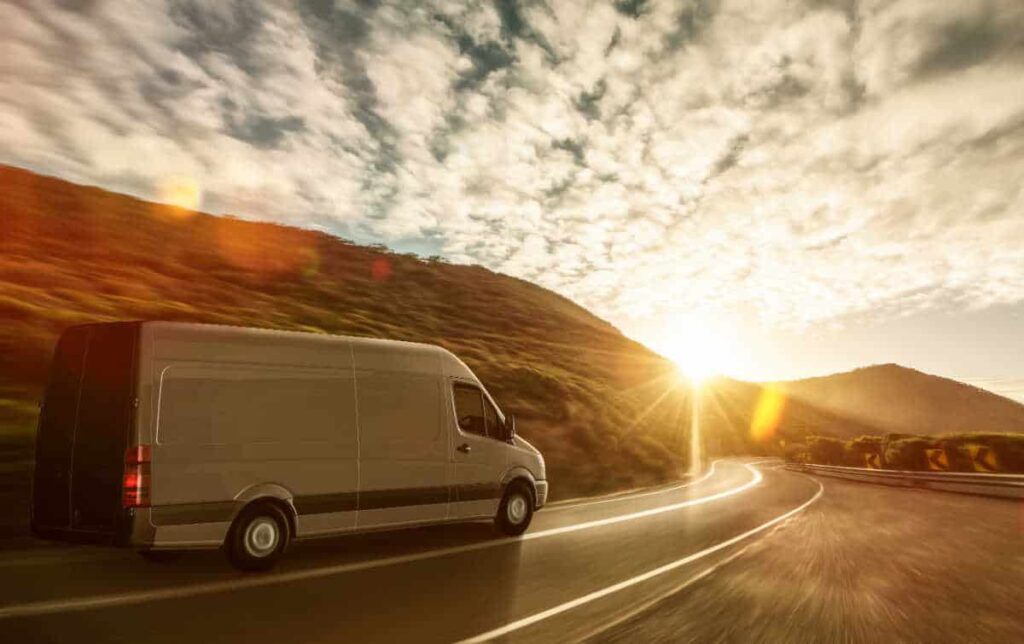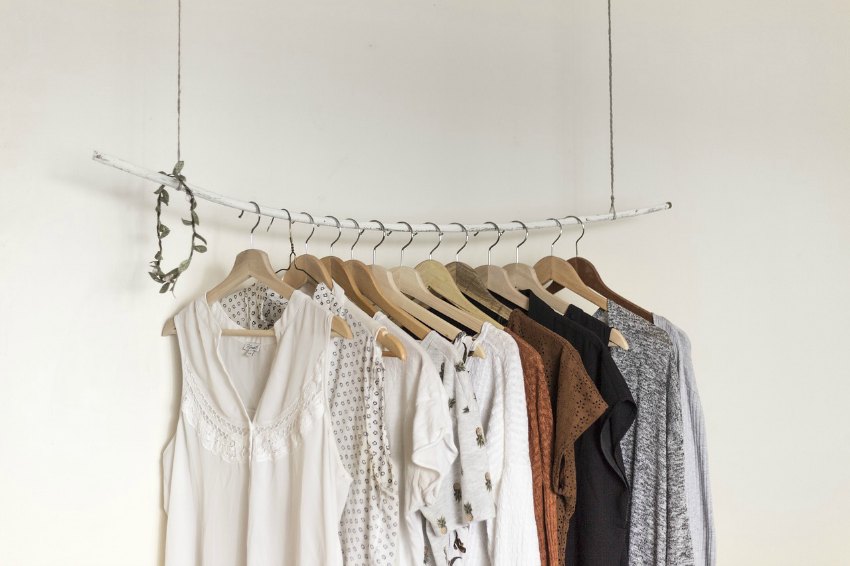Best Ethical Banks, Current Accounts & Credit Cards In The UK
To support the running costs of Moral Fibres, this post contains affiliate links. This means Moral Fibres may earn a small commission, at no extra cost to readers, on items purchased through these links.
Want to find out who the best ethical banks are in the UK in 2023, for current accounts, ISAs, mortgages, and credit cards? Read on!
I hadn’t really thought about what banks invested in until a few years ago. I just popped my money in the bank, took it out again, and so on. That was that. No thoughts about it, or how ethical the banks might be. Then I found out that how we manage our money can be one of the most impactful environmental things we can do, particularly when it comes to climate change.
Why Should We Switch to An Ethical Bank?
It’s really important to switch to an ethical bank because the money that we deposit into our bank account doesn’t just sit in a vault until we need to withdraw it.
Banks use the money we deposit in our current and savings accounts to fund their other profit-making banking activities – from loans to investments. This means, depending on who you bank with, your money could be funding all sorts of projects that you don’t agree with and don’t necessarily know about.
I was pretty uncomfortable when I began to become aware of links between the high street banks to pretty unsavoury things. I learned that the High St banks are linked to the arms trade and bomb-making.
Other things I learned were that banks speculate on food prices (pushing prices up) and that they invest in environmentally damaging activities like oil and gas and tar sands mining. And they aren’t just investing their money, they’re investing our money that we deposit in our accounts.
Fossil Fuel Financing
I looked into it more, and between 2015 and 2018 alone, the world’s biggest banks invested $1.9 trillion into fossil fuel financing. Edie reports one of the UK’s worst offenders is Barclays, who have provided £91 billion in funding to fossil fuel companies. This includes companies involved in coal, tar sands, Arctic oil projects, and fracking, as well as the major players in the extraction and use of fossil fuels.
The other is HSBC, which has contributed £67 billion over the same period. Greenpeace also reports that both companies own shares in fracking companies.
What’s more, according to a 2018 report from Ethical Consumer:
- RBS has shareholdings in companies that are involved in deforestation due to palm oil. Within these companies are serious workers’ and human rights issues.
- HSBC, Lloyds Bank, RBS, and Barclays all lend to companies selling arms to Israel. What’s more, Barclays and HSBC both own shares in these companies.
- Santander has over 21 subsidiaries in tax havens pointing to unethical tax avoidance strategies.
- Between January 2014 and October 2017, Lloyds Bank made $2,986 million available to nuclear weapon-producing companies
Best UK Ethical Banks for 2023

As banks depend on our money to fund these types of investments and to keep them afloat, one of the ways to change this is to switch to a more ethical bank. Doing so helps to create a fair banking system that works in our interests. Yet surprisingly, 75% of people have never switched current account bank account providers before.
With an increase in UK ethical banks, there’s never been a better time to switch. Here’s my guide to the best UK ethical banks for 2023. From current accounts to savings accounts, and to credit cards and mortgages.
Please note this post does not constitute financial advice and is provided for general information purposes only. I have no commercial relationship with any of the banks or financial products listed here.
Best Ethical Current Accounts
Here are the most sustainably-minded current accounts I’ve come across in the UK:
Triodos Bank
Triodos offers an ethical current account. What makes it ethical is that Triodos finances projects based on their social, environmental, or cultural impact.
What’s more, refreshingly, Triodos only lends to businesses and organisations that promote or provide long-term positive change. From wind farms to organic farms, to fair trade enterprises, social housing, or community projects, customers are able to see where money has gone and what it’s doing via its website.
Building Societies
Building societies are more ethical than high street banks because they face stringent regulations that limit the amount of money they can invest in certain industries. Their profits are also invested back into the business for the benefit of borrowers and savers rather than shareholders, giving them that added edge.
Building societies that offer ethical current accounts include Cumberland Building Society and Nationwide. Both are ranked fairly high as ethical providers of current accounts by Ethical Consumer and are great choices if you would prefer your money to be backed by a High St presence.
Challenger Banks

Monzo, one of the so-called app-based Challenger Banks, is currently a good ethical alternative. Monzo does not currently make large corporate loans or investments and therefore does not directly fund industries like the fossil fuel industry. However, it is important to bear in mind that Monzo may do so in the future. I have not been able to find any commitment that says that Monzo will not.
I personally bank with Monzo and really rate it. Monzo in particular has changed my outlook on money. You can set up ring-fenced savings pots and savings goals within your current account, and its useful app interface gives you much greater control over your money. It’s not hyperbole when I say switching to Monzo has been life-changing.
With the Monzo Premium account, you can even ditch the plastic bank card, and switch to a sleek recyclable metal one instead.
I just wish Monzo could commit to only making ethical investments in the future.
I used to include Starling in this list. However, in March 2021 Starling took investment from the Qatar Investment Authority (QIA). This authority was set up in 2005 to invest Qatar’s substantial oil and natural gas revenues around the world.
Starling Bank says that “one of the key roles of QIA is to reduce Qatar’s dependence on revenues derived from oil and gas and to expand investment into non-hydrocarbon sectors. That’s one reason why it has been investing in a range of well-known British brands in addition to Starling.”
This is a disappointing move from Starling, and as such, I don’t classify Starling as an ethical bank.
Ethical Savings Accounts

The ethical savings account market is wider than the current account market. What’s more, there are a lot of great innovative ways to ethically save your money.
As well as the regular building societies, there are some other notable inclusions. However, it’s important to bear in mind that with these options interest rates are not hugely competitive. This is because they are unable to compete with the Big Five banks (Lloyds, RBS, HSBC, Barclays, and Standard Chartered. These banks own 85% of the banking sector and exert a lot of control. Not that interest rates are in great shape in 2023.
Building Societies
Ecology Building Society saving accounts top the Ethical Consumer’s list of most ethical saving accounts. Ecology provides mortgages for eco homes and similar sustainable developments that have traditionally been difficult to get a mortgage on.
This sustainable development is funded through its savings accounts. These accounts are simple and transparent and can be accessed online or by post.
Alternative Banks
If you are looking for an ethical savings account, then Charity Bank is banking with a difference. Not only does the bank lend to charities, but is a charity itself.
Don’t worry, it is fully regulated by the FSA meaning your savings are guaranteed. The bank supports 1,000 charities and community organisations, and says it has “improved the lives of 3.5m people”.
Transparency is key to the bank. Customers can track where money has gone by following projects it has invested in on the website. Charity Bank also offers various ethical savings accounts for adults.
Meanwhile, Triodos Bank offers a wide range of ethical savings accounts, including an ethical savings account for children.
Ethical Cash ISAs
Ecology, Charity Bank, and Triodos top the ethical league table for Cash ISAs. The Building Societies are not too far behind on ethics, so don’t be afraid to check out Building Society offerings.
Ethical Mortgages
If you’re looking for an ethical mortgage to fund an eco build then a mortgage from Ecology is the most ethical on the market according to Ethical Consumer’s list of ethical mortgages.
If you’re looking for an ethical mortgage on a standard house then the most ethical option is to use a building society. Ones to try include Skipton, Coventry, Cumberland, or Kent Reliance Building Societies.
Ethical Credit Cards
Until recently I didn’t think you could get an ethical credit card. Then I discovered a wave of mobile-only app-based challenger banks that are beginning to roll out credit cards. This means you are no longer tied to the big banks for your credit needs.
Again, like the challenger banks, these app-based credit card companies do not currently make large corporate loans or investments. They, therefore, do not directly fund industries like the fossil fuel industry. However, it is important to bear in mind that they may do so in the future.
Jaja
Jaja credit cards make credit simple. Its app and online-only banking system are designed to give credit card customers easier access, more control, and greater flexibility.
In order to treat customers fairly and to be a responsible lender, instead of focusing on 0% balance transfer offers, Jaja has invested more in its customer experience, products and services. It has also focused on the ability to help people better manage their payments and spending.
Tymit
Tymit is a new concept in credit cards. When you purchase something on your Tymit card, you pay back the balance in fixed instalments. This means you don’t get stuck in a minimum payment rut that takes years to clear.
At the point of purchase of an item, you select a repayment plan that is affordable to you. You can repay over 3 months, in three fixed monthly installments at 0% APR. Alternatively, if you need longer to pay, you can spread the cost with fixed instalments over 6, 12, or 24 months. A transparent cost for each option is shown upfront. And by paying a fixed fee to borrow money, you don’t pay interest on your interest.
Ethical Pensions
As your pension will most likely be in the hands of your workplace, you may have little control over who your pension is invested with, and what it is invested in. If this is the case, then encouraging your workplace to divest to a more ethical pension scheme is your best way forward. The Make My Money Matter is a good starting point to find out more.
If you are self-employed and/or have a personal pension then the good news is you have more autonomy over what you do with your pension.
The bad news is that choosing the right ethical pension can be incredibly complicated. Not only do you need to find a more ethical pension company, but you also need to find an ethical fund to put your money in.
I would really recommend seeking independent financial advice on this one. This is because as with all investments, your capital is at risk. The value of your investment can go down as well as up, and you may get back less than you invest.
How Easy Is It To Switch To An Ethical Bank?
If this has inspired you to switch to a more ethical bank then you’ll be pleased to hear that now is a good time to move your money. This is because you can now reliably switch accounts in just seven days. This is definitely a lot less hassle than it used to be.
What do you think? Do you bank with an ethical provider, or would you consider switching banks to a more ethical one?
Do also check out my guide on how to make ethical investments.
Found this post useful? Please consider buying me a virtual coffee to help support the site’s running costs.





My only issue is this called app based banking. Really don’t like the idea of complete dependency on the phone as well as the challenge we all have to face is the data storing. Surely using DNA for storing it isn’t ethical and so extremely dangerous.
Starling Bank has pledged to become a NetZero company (https://www.starlingbank.com/about/). They have also pledged not to provide banking services to organisations that use excessive power to systemically promote public behaviour that is harmful to individuals, groups or to the whole of society in order to maximise their own profits. This may include, for example, arms manufacturers and tobacco companies. They do not invest in such organisations or take investment from them. (https://www.starlingbank.com/about/ethics-statement/)
This is nonsense – they’ve taken investment from Qatar. They can claim to be ethical but their actions are clearly not.
Starling have accepted investment from QIA (Qatar) and so sadly should not be considered an ethical choice.
Super helpful
I can’t see a date when this site was last updated but following the link to the ethical consumer website shows the Coop bank 2nd from top at 12.5 out of 20, just below the Triodos bank at 14.
Is the situation that fluid or has the Coop been revamped after loosing its independence from outside influences?
Im at the start of reviewing what options are available towards more ethical lines..so money is amongst my queries , I’m considering just how debilitating it would be to the Large Corporate Banks if 90% of Us the public switched to ethical banking ,,how deflating that ‘apparency’ of power would be to this sector..a bouncy castle losing air rapidly comes to mind..as their power is non existent without our input I believe or at least we are a significant portion ..! Empowering to consider .
Hilary
I like very much the bouncy castle deflating, Could do a sketch Monty Python style. Lots of water too.
I have been doing Source Foods for over 28 years and tridios bank (already have money snobs club, basically) did not believe in me (fixed idea dumb and righteous and that is why biodynamics has stayed very small) at the onset of my want to be with the ethical all those years ago. Co op was the only other option and did that for a number of years. They were light years behind and made simple transfers long winded and cost. In the skunk and washing powder town I work near there was a lone Barclays, so opted for that as it was chqs then and getting to the co op, no where near was not conducive to all hours at the helm. Since then lloyds and back to barclays.
I will be contacting tridios again to see how the who you know rather than what you do gang respond
Do you have any info on Metro Bank’s claims of being an ethical bank? Thanks for the useful info. We have to make our money count!
Just the sort of info i need ~ Co-Op’s link with eg Lloyds is worrying, and tho First Direct rate high for customer service they dont seem to have an ethical policy ~ your links & poss options much appreciated!
My pleasure Jackie! Glad I could help! :)
Triodos also now offer a current account for businesses (including small businesses) and charities.
Thank you very much. I also only recently discovered my precious first direct who have served me so well, invests in everything that makes me shudder so I am sadly in the process of switching.
My pleasure Jill, glad you’ve found the article useful! Good luck switching!
Thank you so much. Really useful!
BRILLIANT!